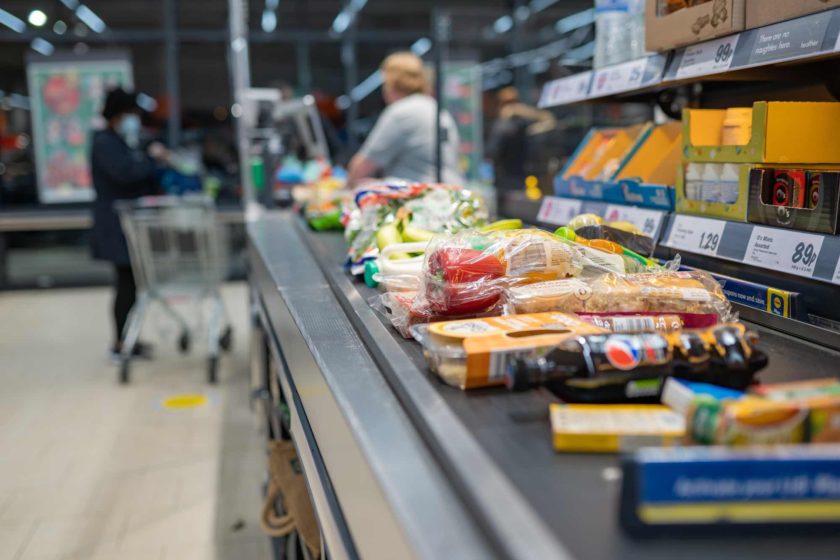UK shoppers misled by some origin labelling on food in supermarkets, claims Which?

A UK consumer watchdog investigation has revealed inconsistent and misleading origin labelling on food in supermarkets.
Which? says shoppers are being misled by supermarket signs and labels that inaccurately portray imported food as British.
Some pork and beef products displayed Union Jacks and ‘Made in Britain’ stamps on their packaging, despite containing meat sourced from the EU.
A survey of 2,011 UK adults by the consumer champion revealed that only half (51%) of shoppers said they find the current origin information presented on groceries helpful. Two-thirds (64%) told Which? they would be more likely to buy a product labelled ‘British’ than one that was not.
Which? researchers visited the UK’s biggest supermarkets and found examples of loose cauliflowers, red cabbage, courgettes and onions at Sainsbury’s, peppers, melons and mangoes at Asda and spring onions at Aldi, with no visible origin labelling on the shelf edge or the products themselves.
This was despite the survey research showing that two-thirds (68%) of consumers consider it important to know where fresh fruit and vegetables come from.
Under the current origin labelling rules, it is a requirement for there to be a country or place of origin label on meat, fish, fresh fruit and vegetables, as well as honey and wine, but the rules do not generally apply to processed meat or frozen or processed fruit and vegetables. There is a requirement to provide origin labelling if it would be misleading not to.
Other labels had fairly meaningless information; such as a pack of sausage rolls from Lidl which stated they were processed using ‘UK and non UK pork’ and a pack of gammon joints at Iceland where the pork was labelled as ‘EU and non EU origin’.
Almost three-quarters (72%) of respondents in Which?’s survey said it was important to know where fresh meat comes from.
Meanwhile, Aldi’s Crestwood bacon and cheese wraps had Union Jacks and ‘Made in Britain’ on the front of the pack.
However, Which? researchers felt that the flag was misleading as the label on the back of the pack said they were in fact made with pork from the EU. The same was found with an Aldi steak and gravy pie.
Researchers also found inconsistencies, such as Charlie Bigham’s lasagne ready meal, which lists its beef as British, but its moussaka fails to mention the origin of the lamb used. Half (51%) of respondents in the survey said it is important to them to know where processed and tinned meat comes from.
Which? also found examples of misleading signage and shelf labels in the stores it visited. Tomatoes from Morocco, parsley from Italy and sweet mini peppers from Spain sat on a shelf under a large banner decorated with a Union Jack and the words ‘Championing Great British Quality’ at the Aldi store Which? visited.
In one Asda, Which? found cauliflowers that had a Union Jack on the shelf label but were actually from Spain.
Elsewhere, there was a lack of consistency between some products, with a whole own label pineapple in Tesco featuring country of origin information while a packet of pineapple chunks on the next aisle had nothing written on it at all. This is permitted within the current origin labelling rules due to the different way that chopped fruit is treated, but is not particularly helpful for consumers.
Origin information is important to shoppers. The survey revealed that nearly six in ten (59%) of shoppers who check for origin labelling do it because they want to support their local economy. Meanwhile, 58 per cent of shoppers use it to help assess product quality and about half (52%) use it to try to understand the product’s environmental impact.
Which?’s investigation shows origin labelling needs to be improved if it is to properly help shoppers make informed decisions that align with their values.
The consumer champion will be sharing its findings with the Department for Environment, Food and Rural Affairs for its consultation on fairer food labelling, which was launched on 15 March by Environment Secretary Steve Barclay, as Which? believes there is scope to improve country of origin labelling.
Which? says that manufacturers should also make sure loose fruit and veg is better labelled and consider the voluntary labelling of more processed meat products.
Ele Clark, Which? Retail Editor, said:
“Which? research has uncovered a surprising amount of inconsistent and misleading food labelling, suggesting that – even when the rules are properly adhered to – consumers aren’t getting all the information they want about their food’s origin.
“Shoppers want to know where their food comes from for multiple reasons, including supporting British suppliers and making more sustainable choices.
“Supermarkets should particularly focus on labelling loose fruit and vegetables more clearly, but manufacturers and retailers should also consider providing origin information on more processed meat products so shoppers are armed with the information they need to make informed choices.”
In response to the Which? findings, major UK supermarkets emphasised their commitment to clear and compliant labeling of product origins. Aldi highlighted their support for over 5,000 British suppliers, expressing a strong commitment to stocking British produce when available, though acknowledging seasonal limitations.
Asda outlined their stringent processes to ensure visibility of origin information at both shelf edges and on product packaging, noting efforts to reinforce these practices among staff.
Iceland affirmed their adherence to UK government guidelines, specifically those from the Department for Environment, Food, and Rural Affairs (DEFRA), ensuring their products meet quality and value expectations.
Sainsbury’s detailed their proactive measures to display origin information clearly, including regular checks in collaboration with the Animal and Plant Health Agency.
Lastly, Tesco stated their dedication to honest communication, ensuring customers have access to essential information to make informed purchases, in line with UK food labeling regulations.
[Image: https://depositphotos.com]
Spotted something? Got a story? Email: [email protected]
Latest News
